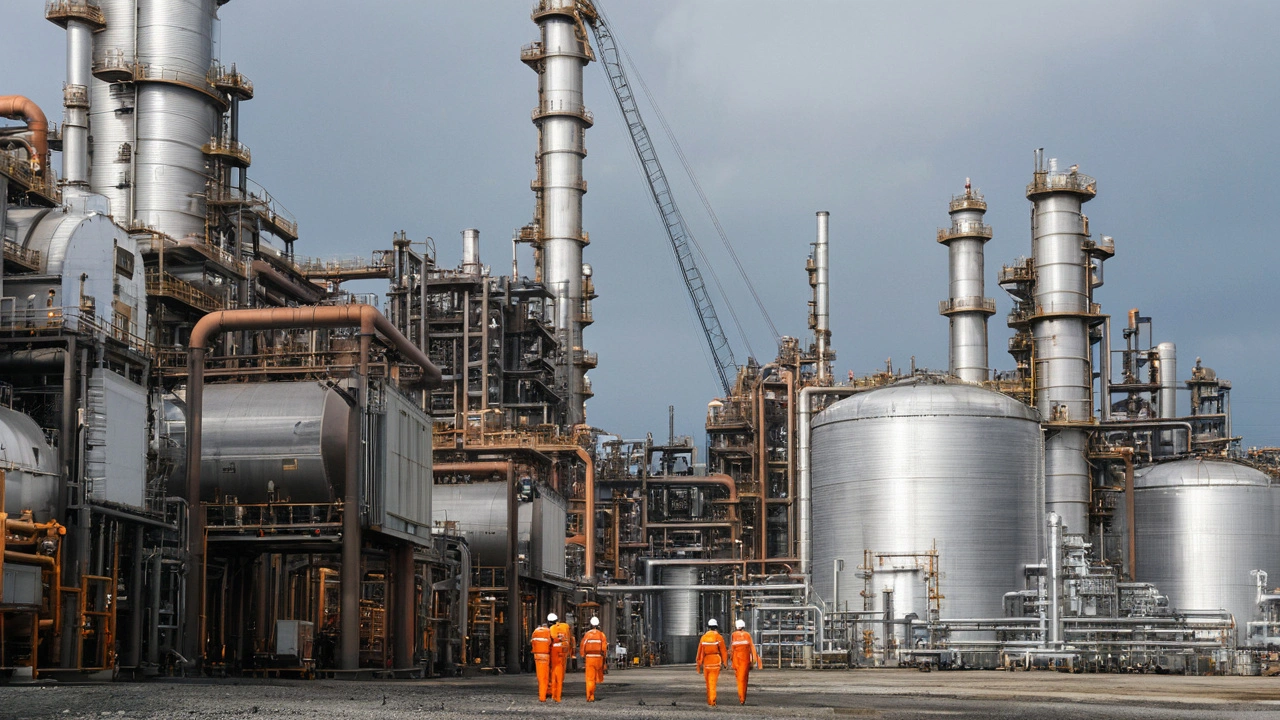Understanding the NNPC's Acquisition of Dangote Refinery Stake
Recent discussions and social media posts have brought up claims that the Nigerian National Petroleum Corporation Ltd (NNPC) borrowed $1.03 billion from the International Monetary Fund (IMF) to acquire a 20% stake in the Dangote oil refinery. This information, however, is misleading and has been clarified through a rigorous fact-checking process. It's important to disseminate accurate information, especially regarding financial transactions involving significant assets and national enterprises.
The correct details surrounding this acquisition reveal a different funding story altogether. The NNPC Ltd indeed acquired a 20% stake in Dangote's oil refinery, but the financial mechanics involved in this transaction differ drastically from what has been circulated in some quarters. Let's delve deeper into the accurate details and clarify the origins of the funds used for this significant investment.
Breakdown of the Financial Mechanics
The total amount involved in the acquisition deal for the 20% stake in the Dangote Refinery was $2.76 billion. This figure itself points to a higher financial engagement than the incorrectly reported $1.03 billion IMF loan. The core funding, however, was structured through Lekki Refinery Funding Limited, not directly from the IMF as previously misreported.
Specifically, NNPC Ltd secured funding amounting to $1.036 billion from Lekki Refinery Funding Limited. Out of this amount, $1 billion was subsequently transferred to Dangote for finalizing the deal. This arrangement underscores a financial strategy that diverged significantly from mere reliance on an IMF loan, showcasing a complex yet strategic financial structuring approach to fund the acquisition.
Addressing the Misconceptions
The dissemination of false information regarding financial transactions can lead to widespread misunderstanding and potential mistrust in corporate and governmental decisions. It is essential for stakeholders and observers to rely on verified data, especially concerning sizeable investments such as this one. It wasn't a hasty loan acquisition from an international financial body but a well-structured financing plan using Lekki Refinery's resources.
In dealing with such crucial information, media literacy and responsible reporting play vital roles. Ensuring that financial dealings are reported accurately helps maintain credibility and trust in both the involved entities and the broader information ecosystem.
The Significance of the Dangote Refinery Investment
The Dangote Refinery represents one of the most significant infrastructural projects in Nigeria's oil sector. Upon completion, it promises to transform not just the nation's oil industry but also significantly bolster its economy. Such a substantial project drew interest from NNPC Ltd, leading to their strategic decision to acquire a 20% stake.
Understanding the true nature of the financial transactions behind this acquisition is critical. The funding strategy employed by NNPC Ltd reflects a cautious yet ambitious approach to investing in durable infrastructure. It underscores their long-term vision and commitment to supporting industrial growth within Nigeria. This 20% stake acquisition is not just a transaction but a strategic investment into the future capabilities of Nigeria's refining industry.
Impact on the Oil Market
Having NNPC Ltd as a substantial stakeholder in the Dangote Refinery changes the dynamics for Nigeria’s oil and gas sector. This investment is poised to enhance the country’s refining capacity, reduce crude oil export dependency, and importantly, cut down on the importation of refined petroleum products. The refinery project is also expected to have significant downstream economic effects, including job creation and fostering related industries’ growth.
In broader terms, it reflects Nigeria’s strategic moves towards self-reliance in petroleum product refining, which would eventually result in favorable balance-of-trade figures. The collaboration between a national entity like NNPC Ltd and a leading private player such as Dangote Group illustrates a unique blend of public and private sector partnership aimed at national prosperity.
Conclusion
In conclusion, the narrative that NNPC Ltd borrowed $1.03 billion from IMF to facilitate its venture into the Dangote Refinery is debunked. The actual funding route involved a more structured and corporate-specific financial arrangement through Lekki Refinery Funding Limited, highlighting a strategic approach rather than a simplistic loan acquisition. Understanding and reporting the accurate financial structures behind such transactions are paramount to ensuring transparency and fostering informed discourse among stakeholders in the oil sector and the broader public. As Nigeria continues to fortify its infrastructural backbone, accurate information dissemination will remain a bedrock for sustained progress and trust.




It's great to see the facts finally coming out about the NNPC deal, and it shows how thorough analysis can cut through the noise. The actual $2.76 billion figure far outstrips the bogus IMF loan story that was floating around. By pulling funding through Lekki Refinery Funding Limited, the NNPC demonstrated a smarter, more strategic approach. This kind of financial engineering deserves recognition, not ridicule. Let's keep the conversation focused on the real numbers and the impact on our industry.
Wow...another rumor mill spin, huh??? Turns out the IMF didn't hand over a single dime, and the numbers were off by a mile; still, some folks love drama!!!
The post lays it out plain and simple. No fancy jargon, just the real deal. NNPC used a private vehicle, not the IMF, to get the cash. It's a classic case of people believing the easiest story.
Truth is a mirror that reflects only what we allow it to show. In the end the financing route matters less than the intent behind it. Knowledge without clarity is hollow.
First, the NNPC's decision to take a 20% stake in the Dangote Refinery is a bold strategic move that signals confidence in domestic refining capacity. Second, the financing package, amounting to $2.76 billion, was assembled through Lekki Refinery Funding Limited, not through an IMF concession as many claimed. Third, this distinction matters because it highlights the government's ability to mobilize private capital for national projects. Fourth, the $1.036 billion secured from Lekki was channeled directly to Dangote, ensuring the transaction proceeded smoothly. Fifth, by avoiding a public loan, NNPC sidestepped the usual conditionalities tied to IMF assistance. Sixth, this approach preserves fiscal flexibility for other pressing budgetary needs. Seventh, the partnership between a state oil giant and a private conglomerate fosters a collaborative model for future infrastructure. Eighth, the refinery's projected output will reduce Nigeria's reliance on imported refined products. Ninth, that reduction translates to better trade balances and more jobs for local communities. Tenth, the influx of refined fuel domestically can stabilize prices for consumers across the country. Eleventh, it also opens possibilities for exporting refined products to neighboring nations. Twelfth, the success of this venture could encourage similar public‑private partnerships in other sectors. Thirteenth, transparency about the funding source builds public trust and discourages misinformation. Fourteenth, accurate reporting ensures that stakeholders can make informed decisions about the economy. Fifteenth, in sum, the NNPC’s move is a testament to innovative financing and a forward‑looking vision for Nigeria’s energy future.
Yo, this is pretty cool – NNPC teaming up with Dangote shows we can get big things done. Gonna watch how this plays out, hope it brings more jobs and cheaper fuel for everyone. Let’s support the effort and spread the real story, not the fake IMF nonsense.
Great news for Nigeria’s future!